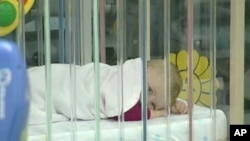It is called crib death or SIDS which stands for sudden infant death syndrome. Parents put a seemingly healthy infant to sleep and return to find the baby has stopped breathing. The causes remain a mystery, but new research suggests a chemical imbalance in babies' brains may provide a clue.
Nothing prepares a parent for what Marchand Lewis experienced three years ago.
"Picking your child up out of a crib who's passed away, I mean, she was lifeless, and heavy, and limp. So I absolutely knew," she recalled. "If there's anything lingering it's, 'Could we have done something.' That's always there."
But even when parents follow all the guidelines, putting their babies to sleep on their backs, removing blankets and stuffed animals from their cribs, infants still die without warning. The latest research focuses on serotonin, a chemical in the brain.
"We found that the babies who died of SIDS had abnormalities in serotonin in regions of the brain stem that control breathing and heart rate and blood pressure during sleep," said Dr. Hanna Kinney of Children's Hospital in Boston.
Dr. Kinney and other researchers at Children's Hospital in Boston studied the brains of babies who died from SIDS and compared them to brains of babies who died of other causes.
"This is where we have found the major problems in SIDS. Although we have looked at all levels of the brainstem, the major problems are here," Dr. Kinney added.
When a baby is put face down in a bed, it begins to re-breathe carbon dioxide, which is toxic.
"A normal baby could respond to that challenge, lift its head up, turn its head and arouse or wake up," explained Dr. Kinney. "But a baby who has a defect in those brain stem circuits that use serotonin can't do that when challenged and they go on to die."
In studying babies' brains, the researchers found that babies who died of SIDS had 25 percent less serotonin and related chemicals than the babies who died of other causes.
At present, doctors cannot measure the amount of serotonin in a living baby's brain. But researchers hope that one day they will be able to do that though a simple blood test, and prevent more deaths like Suzanna's. The report is published in the Journal of the American Medical Association.











